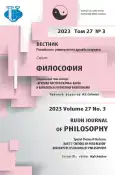Legacy of I. Kant and H. Arendt: Comprehension of World in Hermeneutical Perspective
- 作者: Gubman B.L.1
-
隶属关系:
- Tver State University
- 期: 卷 27, 编号 3 (2023): KANT’S “CRITIQUE OF PURE REASON” AND WAYS OF ITS READING BY PHILOSOPHERS
- 页面: 614-628
- 栏目: KANT’S “CRITIQUE OF PURE REASON” AND WAYS OF ITS READING BY PHILOSOPHERS
- URL: https://journal-vniispk.ru/2313-2302/article/view/325240
- DOI: https://doi.org/10.22363/2313-2302-2023-27-3-614-628
- EDN: https://elibrary.ru/GXAIVS
- ID: 325240
如何引用文章
全文:
详细
H. Arendt developed largely her hermeneutical interpretation of understanding in line with the rethinking of I. Kant’s philosophical heritage. Although she was able to offer a rather original interpretation of the theoretical views of the great German philosopher, her hermeneutic strategy was also influenced by the approaches to their understanding that were proposed by her teachers M. Heidegger and K. Jaspers. Arendt’s hermeneutical teaching proceeds from the need to realize the close unity of practical action and spiritual activity of the human subject - Vita Activa and Vita Contemplativa. Accepting the initial position of Heidegger’s metaphysics of finiteness about the “abandonment” of man in the flow of time, Arendt simultaneously follows Jaspers’ call for the need for an existential-hermeneutic interpretation of practical action and the abilities of the spirit by their understanding on the basis of Kant’s legacy. Singling out thinking, will and judgement among the main vectors of self-realization of the spirit, she demonstrates their close relationship with the main types of practical human activity - work, work and action. Analyzing the abilities of the spirit, Arendt emphasizes the major role of thinking, which brings together the processes of knowledge acquisition and meaning creation. It highlights the primacy of the meaning-producing function of the reason in relation to the ability of the intellect to generate true knowledge on the basis of generalization of the data of contemplation. Describing thinking after Kant as a “thing in itself”, Arendt speaks of its involvement in eternity and time in the moment of the present, the ability to generalize the past and design the future. Thinking forms the core of practical reason, which Kant identified with the will, and opens a new horizon of meaning generation in its aspiration to the future. The ability to judge also turns out to be a product of thinking, referring to the past while relying on common sense and imagination. Arendt rightly argues that the “paralysis” of the faculty of judgement, indicating the significance of Kant’s categorical imperative, threatens not only to produce a distorted vision of history, but also the triumph of the “banality of evil” in the sphere of politics.
作者简介
Boris Gubman
Tver State University
编辑信件的主要联系方式.
Email: gubman@mail.ru
ORCID iD: 0000-0001-7003-5522
PhD in Philosophy, Professor, Chair of Department of Philosophy and Theory of Culture
33 Zhelyabova St., 170100, Tver, Russian Federation参考
- Arendt H. The Human Condition. Chicago: The University of Chicago Press; 1989.
- Arendt H, Heidegger М. Letters 1925—1975. And other documents. Мoscow: Gaidar Institute publ.; 2016. (In Russian).
- Arendt H, Jaspers K. Correspondence. 1926—1969. N.Y.: A Harvest Book; 1992.
- McGowan J. Hannah Arendt. An Introduction. Minneapolis, L.: University Minnesota; 1998.
- Buckler S. Hannah Arendt and Political Theory. Edinburgh: Edinburgh University Press; 2011.
- Gubman B. I. Kant and H. Arendt’s Anthropology. In: Akten des IX Internationalen Kant-Kongreß. Bd. IV. Berlin: De Gruyter; 2001. P. 352—259.
- Arendt H. The Life of the Mind. One-Volume Edition. Vol. I. N.Y.: A Harvest Book; 1978.
- Кant I. The Critique of Pure Reason. In: Collected Works in 6 Vol. Vol. 3. Мoscow: Mysl’ publ.; 1964. P. 69—774. (In Russian).
- Arendt H. The Life of the Mind. One-Volume Edition. Vol. II. N.Y.: A Harvest Book; 1978.
- Beiner R. Interpretative Essay. In: Arendt H. Lectures on Kant’s Political Philosophy. Chicago: The University of Chicago Press; 1992. P. 79—156.
- Belov VN. Introduction to Philosophy of Culture. Мoscow: Academic Project publ.; 2008. (In Russian).
- Кant I. The Critique of Judgement. In: Collected Works in 6 Vol. Vol. 5. Мoscow: Mysl’ publ.; 1965. P. 161—327. (In Russian).
- Soboleva ME. The Logic of Evil. Alternative Introduction to Philosophy. Saint Petersburg: Vladimir Dal’ publ.; 2019. (In Russian).
- Aronson DO. The Ability of Judgment and its Connection with Political Responsibility. In: Arendt H. Responsibility and Judgment. Moscow: Gaidar Institute Publishing House; 2013. (In Russian).
- Hayden P. Arendt and the Political Power of Judgement. In: Arendt H. Key Concepts. Hayden P, editor. L., N.Y.: Routledge; 2014. P. 167—184.
- Arendt H. Lectures on Kant’s Political Philosophy. Chicago: The University of Chicago Press; 1992.
补充文件









